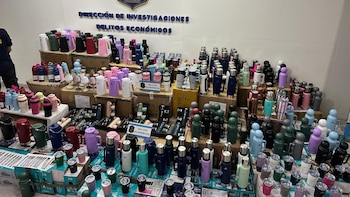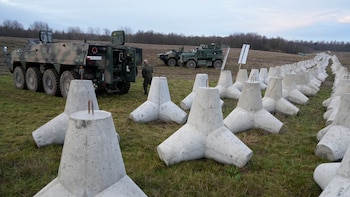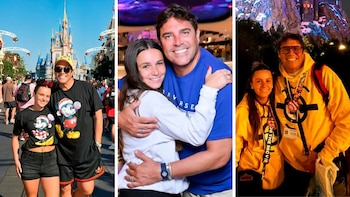
South Korea Leads Field in Olympic Bid Power Index
A commanding lead in public opinion helps put PyeongChang in the lead of the three-city race to host the 2018 Winter Olympics.
The South Korean bid holds a three-point lead over Munich in the Around the Rings Olympic Bid Power Index -- 77 to 74 -- out of 100 possible points across the 11-category index. Annecy lags with 67 points, thereby earning true underdog status as the race heads into a crucial three-month stretch to the July 6 IOC vote.
Now in its seventh year, the Power Index is compiled by the experts at Around the Rings, all of whom have studied and followed the bids from their inception, including multiple visits to each city and extensive interviews with each bid's organizers.
The 11 categories range from ambience to venue plans (see explanation of categories at bottom of this article). Two categories are subjective; the others are based on numbers provided by the bid cities or gathered by ATR. The rankings are not meant to predict the outcome of the IOC vote in July, but to show the relative strengths and weaknesses of the cities.
ATR Olympic Bid Power Index - March 2011 Categories: PyeongChang Munich Annecy Accommodation 6 7 6 Ambience (out of 5) 2 3 4 Bid Operation (out of 5)
4 4 3 Games Cost 7 8 7 Last Games 9 7 6 Legacy 9 7 6 Marketing 8 8 7 Gov/Public Support 10 8 6 Security 7 7 7 Transport 7 7 7 Venues/Experience 8 8 8 POWER INDEX
TOTALS 77 74 67
Annecy Hit by Sagging Public Opinion
The bid from Annecy seemed to be on the ropes two months ago amid a leadership crisis. The team has settled down, but the bid still seems to face long odds. One problem may be public opinion: the IOC survey done in December during Annecy’s darkest hour is expected to show the lowest level of public support among the three bids – barely above 50 percent.
Positives:
Annecy and Chamonix offer a small-town atmosphere, the charm of the French Alps and a stadium for ceremonies on the shore of the pristine lake.
With Chamonix as the host of the first Winter Olympics in 1924, Grenoble in 1968 and Albertville in 1992, there is a wealth of experience and heritage of winter sports. That has lessened the need for venue construction, minimizing the costs of preparation. Same goes for infrastructure, with existing highways and rail service connecting Annecy to Europe.
Government support appears to be unflinching despite the bid’s difficulties. Sports minister Chantal Jouanno's passion for the Olympics and willingness to become heavily involved in the run-up to July 6 is a huge plus. Sensitivity to the environment is high. Athlete involvement in the bid is strong. New CEO Charles Beigbeder brings a vitality the bid could have used a year ago.
Negatives:
The effort to bring the third Winter Games in 50 years to this part of France lacks a compelling story and the novelty that seems to attract IOC votes.
The original venue plan for the Games was modified after IOC criticism, but with venues scattered among four clusters it still presents a challenge.
Also challenging will be accommodations, with more than 500 hotels and inns needed to satisfy IOC needs for housing spread across the Haute-Savoie and Geneva, Switzerland. Indeed, the biggest hotel listed in the Annecy bid file is next to Geneva Airport -- 40 minutes from Annecy and almost two hours from Chamonix.
The bid’s legacy seems unremarkable. There would be new public housing from the Olympic Village; for sport, a new ice rink in Chamonix and a speed skating track, which France now lacks.
Annecy's revamped communications strategy has been slow to materialize and the under-funded bid now faces a tough PR battle against its more organized and better-resourced rivals. Budgetary issues remain a concern as the international campaign heads into the final few laps. After an inauspicious start to its 2018 bid, there is a lingering suspicion that France has its sights set on the 2020 Olympics prize and is only staying the course in this campaign to strengthen its standing in the Olympic Movement.
"Why?" for Munich Still Unanswered
The "Festival of Friendship" theme taps into Germany's passion for winter sports. Together with the wealth of Olympic expertise and some household names on the team – Thomas Bach and Katarina Witt – it makes this an attractive bid. Building on the 1972 Summer Olympics legacy is also part of its narrative.
Munich, like Annecy, faces so-so public support: IOC public opinion polling in late 2010 likely will show support at the 61 percent mark.
Positives:
Transforming some of the 1972 Olympic facilities into ice venues is a neat trick that will go down well with IOC members with memories of those Summer Games. The Snow Park in Garmisch-Partenkirchen is also impressive too. Likewise Kandahar ski resort proved its credentials this year with the staging of the skiing world champs, while the site of the ski jump at the old 1936 Olympic Stadium has a sense of history and charm.
IOC vice president Thomas Bach is an influential figure whose connections with IOC members should help Munich in the July vote. Government backing from Chancellor Angela Merkel remains on a solid footing.
The "unmatched potency" of German sports sponsorship is also a benefit for the bid as the impact of the global recession recedes – the market is projected to exceed €22 billion (approximately $30 billion) in value between 2013 and 2020.
Accommodations and transport elements of the bid are strong.
Negatives:
The venues plan does not rely on any "big build", but the distance between Munich and the sliding center at Koenigssee, more than 90 minutes away, would not be ideal for athletes and spectators.
So far, calls for a referendum by anti-Olympic protestors in the town of Garmisch-Partenkirchen have been all talk with little evidence that enough people will back the NOlympia group to make it happen. But the Munich 2018 bid has struggled to shake off some of their environmental concerns.
If there's one thing the Munich bid lacks, it's a stronger narrative to explain why it deserves to host the Games.
Developing the line taken by Bach at the closing press conference of the IOC Evaluation Commission could be the way forward. Talking about the country's winter sports traditions, he noted that Germany had not hosted a winter Games for 80 years, "10 generations of winter sports athletes have passed without having the Games in this heartland of winter sports."
The commission chair's comments also were revealing. When Gunilla Lindberg said "we have not really seen any big surprises" on the four-day inspection tour, it was perhaps an indication that while the Munich bid is impressive enough and ticks a lot of boxes, it doesn't dazzle.
People, Korea Want These Olympics
The experience of three consecutive bids is helping PyeongChang put the pieces together for a winner – perhaps. The most compact of the three 2018 venue plans, the South Korean bid is backed and organized by the national government. That leaves little doubt about the bid’s ability to deliver on promised venues and infrastructure. But the Koreans will face a big job.
Public support is rock-solid: PyeongChang will win that category based on IOC polling conducted late last year. Expect to see public approval for the Games at the 93 percent level when those results are released in May.
Positives:
With snow blanketing the region for February’s IOC visit, PyeongChang looked like a place to hold the Winter Olympics.
Nearly all venues are within about 30 minutes of the Olympic Village, some much closer.
Government support is a major strength; the bid has not struggled for financing. The overarching involvement of the national government has meant the removal from office of the Gangwon province governor for election law violations. While that is a potentially troubling development, it has had little impact on the leadership of the bid.
Olympic legacy would mean a sliding center, new ski runs and a skating oval. But bid leaders hope the real legacy of the Games would be substantial growth for winter sport in Korea and Asia. The notion of PyeongChang as the first Winter Olympics in South Korea will offer a major edge over Annecy or Munich.
Negatives:
The distance from Incheon Airport to the Olympic venues is about 250km. Seoul is about 200km, which makes the airport the farthest gateway for any of the three 2018 bids. Some $4 billion in transport work will be needed to connect PyeongChang to Seoul, most of that for a high-speed railway. While the new Alpensia Resort shows the high quality of accommodations that South Korea can provide, more are needed. Spectators may have to stay in Seoul to find rooms.
Great attention needs to be paid to improving the ambiance. There are few restaurants, bars, shops or other diversions that Olympic visitors will seek out.
Security should not be an issue, but the North Korean border is just 100km away. A state of war remains in place between North and South – a fact ignored in the PyeongChang bid book.
The Categories Explained
10 points for each category, except Ambiance and Bid Operation, which are scored 5 points each due to more subjective aspects of these categories. This results in a total possible score of 100 points across the 11 categories.
Accommodation: Quantity, quality
Ambiance: Is the city comfortable, tourist-friendly, a pleasure to visit?
Bid Operation: Leadership, strategy and public relations
Games Cost and Finance: Projected bill for operating the Olympics and infrastructure needed, unusual finance risks. Higher scores indicate lower costs.
Last Games in the Country: Years since last summer or winter Olympics. The higher the score, the longer since the Games. Some credit could be given for recent Olympic bids.
Legacy: Impact of the Olympics in a city; sustainable venues
Marketing: The size and impact of marketing programs
Government & Public Support: The commitment of government and population to a Games
Security: Reputation and quality of security, perceptions of risk
Transportation: Ease of travel, multiple transport options, airports, quality of public transit, taxis
Venues and Experience: Overall plan for the Games and experience handling other events, winter sports in particular
Written by Ed Hula, Mark Bisson and Ed Hula III.
Últimas Noticias
Sinner-Alcaraz, the duel that came to succeed the three phenomenons
Beyond the final result, Roland Garros left the feeling that the Italian and the Spaniard will shape the great duel that came to help us through the duel for the end of the Federer-Nadal-Djokovic era.
Table tennis: Brazil’s Bruna Costa Alexandre will be Olympic and Paralympic in Paris 2024
She is the third in her sport and the seventh athlete to achieve it in the same edition; in Santiago 2023 she was the first athlete with disabilities to compete at the Pan American level and won a medal.

Rugby 7s: the best player of 2023 would only play the medal match in Paris
Argentinian Rodrigo Isgró received a five-game suspension for an indiscipline in the circuit’s decisive clash that would exclude him until the final or the bronze match; the Federation will seek to make the appeal successful.

Rhonex Kipruto, owner of the world record for the 10000 meters on the road, was suspended for six years
The Kenyan received the maximum sanction for irregularities in his biological passport and the Court considered that he was part of a system of “deliberate and sophisticated doping” to improve his performance. He will lose his record and the bronze medal at the Doha World Cup.

Katie Ledecky spoke about doping Chinese swimmers: “It’s difficult to go to Paris knowing that we’re going to compete with some of these athletes”
The American, a seven-time Olympic champion, referred to the case of the 23 positive controls before the Tokyo Games that were announced a few weeks ago and shook the swimming world. “I think our faith in some of the systems is at an all-time low,” he said.




